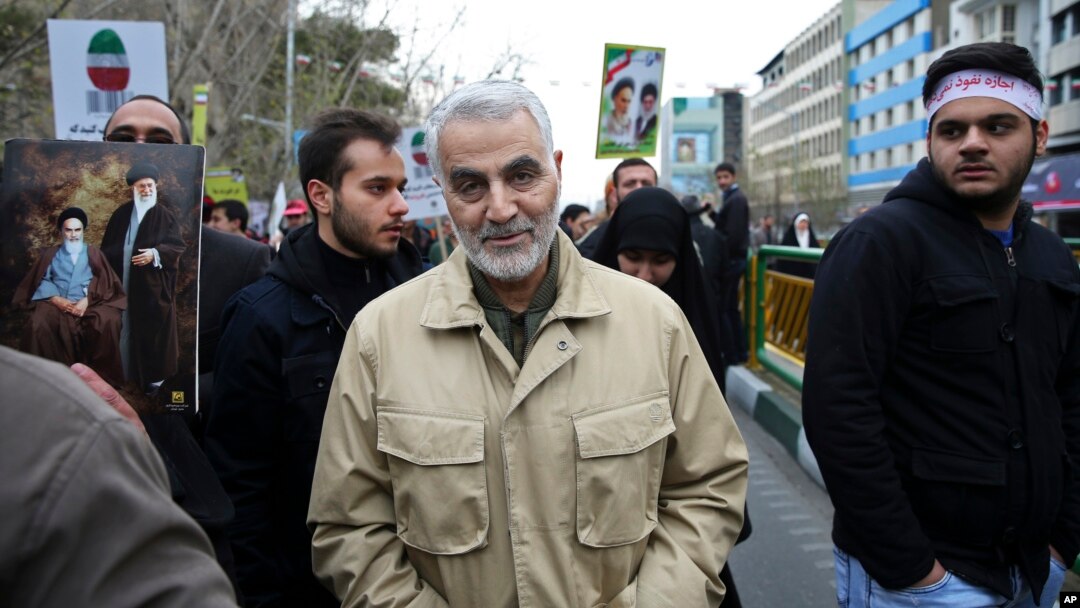The Trump administration says it cannot confirm that an Iranian general barred from foreign travel by the U.N. Security Council visited Russia this week, despite a prominent U.S. congressman and news outlet saying he had made the trip.
In an emailed response to a VOA Persian query Friday, a U.S. State Department official who requested anonymity said the administration is aware of media reports about recent travel to Russia by General Qassem Soleimani, commander of the special operations Quds Force of Iran’s Islamic Revolutionary Guards Corps (IRGC).
“We’re not in a position to confirm the travel ourselves at this time,” the official said. “As with previous reports of similar travel, the U.N. travel ban on Soleimani remains in effect, so such travel, if confirmed, would be a violation of U.N. Security Council resolutions and, thus, a serious matter of concern to the United States and members of the U.N. Security Council.”
Congressman doesn't hesitate
Republican Congressman Ed Royce, who chairs the House Foreign Affairs Committee, expressed no such hesitation when speaking about Soleimani on Thursday to U.S. television network Fox News. He said the Iranian general “was just caught in Moscow violating existing sanctions on his travel.”
A day earlier, a Fox News online report cited “multiple Western intelligence officials with direct knowledge of (Soleimani’s) visit” as saying that the Iranian general “arrived in Terminal A of Vnukovo airport outside Moscow on February 14 on Mahan Air WD084 at 12:13 p.m. local time and was scheduled to remain in Russia for a few days for meetings.”
Royce said “it is the third time” that Soleimani has visited Russia since the U.N. Security Council approved resolution 2231 endorsing Iran’s nuclear deal with world powers July 20, 2015.
A spokesman for Royce did not respond to a VOA email asking for the source of the lawmaker’s information about the Iranian general, whom the lawmaker accused of being responsible for the deaths of about 500 U.S. military personnel in Iraq by leading a Quds Force effort to supply weapons to anti-American Iraqi Shi’ite militants.
The UN resolution
Section 6 (e) of resolution 2231’s Annex B calls on all states to “take the necessary measures to prevent the entry into or transit through their territories of individuals” designated by the council as having engaged in illicit activities — a designation it had given to Soleimani in the past.
Western media have quoted sources as saying Soleimani visited Russia July 24, 2015, days after resolution 2231’s adoption, and made a second trip April 14, 2016.
Jeffrey Feltman, U.N. Under-Secretary-General for Political Affairs, notified the Security Council last July of “possible foreign travel” by Soleimani “contrary to the provisions” of resolution 2231.
Congressman calls for sanctions
Royce said he had obtained photographs of Soleimani’s previously reported visits to Moscow and criticized the Obama administration as being weak for not confirming that the trips had happened and that the U.N.’s travel ban had been violated.
He called on the Trump administration to respond to Soleimni’s latest reported Russia trip by imposing new sanctions barring companies from doing business in Iran.
Earlier this month, the Trump administration announced its first sanctions against Iran since taking office in January. It froze any property or funds held by 13 Iranian individuals and 12 companies under U.S. jurisdiction, in retaliation for Iran’s January 29 ballistic missile test that Washington criticized as undermining regional security and putting American lives at risk.
There has been no word from the White House of any additional Iran sanctions under consideration.
Fox News reported that Soleimani was in Moscow this week to express displeasure with Russia’s recent military and economic overtures to Saudi Arabia and other Arab states that Iran sees as rivals for regional influence.
But former U.S. intelligence officer Paul Pillar, now a security studies analyst at Georgetown University, told VOA Persian it is incorrect to presume that Soleimani was in Moscow to communicate Iran’s resentment about Russian relations with Arab nations.
“The focus (of the trip) obviously would be on events in Syria, where both Russia and Iran, especially the IRGC headed by General Soleimani, are heavily involved in the effort to shore up the position of the Assad regime,” Pillar said.
The Iranian defense ministry’s news agency published photos of Soleimani attending a ceremony in Tehran on Thursday, two days after his reported arrival in Moscow. The website’s homepage initially said it had posted the photos “in response to U.S. claims” about the general, but it later removed that language.
The Russian embassy in Washington did not respond to a VOA request to confirm or deny that Soleimani was in Moscow this week. Russia and Iran both have denied the previous reports of Soleimani traveling to Moscow.
Additional reporting by Senior Diplomatic Correspondent Steve Herman, Hooman Bakhtiar of VOA’s Persian Service and Mehdi Jedinia of VOA’s Extremism Watch Desk.


